 Petzlover
PetzloverBoth Farm Cat and Selkirk Rex are originated from United States. Both Farm Cat and Selkirk Rex are having almost same weight. Farm Cat may live 3 years more than Selkirk Rex. Both Farm Cat and Selkirk Rex has same litter size. Both Farm Cat and Selkirk Rex requires Moderate Maintenance.
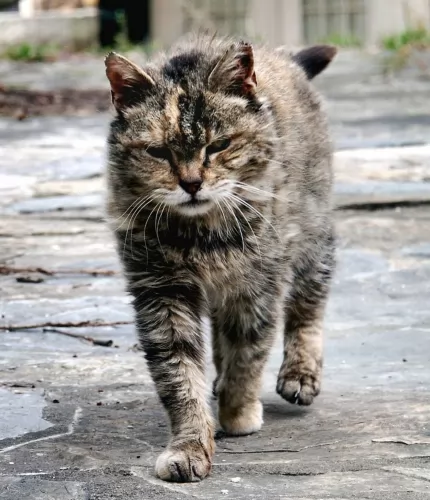 Known also as the Barn Cat, this domestic cat is of a mixed breed. The very name ‘farm cat’ is referring to a general kind of cat that lives in an almost wild state on farms and agricultural properties.
Known also as the Barn Cat, this domestic cat is of a mixed breed. The very name ‘farm cat’ is referring to a general kind of cat that lives in an almost wild state on farms and agricultural properties.
Possibly, their role in keeping rodents at bay was how they came about – domesticated to keep rodents away from grain crops.
When you do research you find that there is archeological evidence to suggests that these farm cats have been around since about 7500 BC. Most barn cats fall under the domestic shorthair or domestic longhair categories.
These cats live in a variety of conditions and some of them get their food solely from the rodents they catch. Others are tame with access to supplemental cat food as well as veterinary care.
The Selkirk Rex originated in the USA in 1987. A host of cats have been used to develop this cat breed – Persians, British Shorthairs, Himalayans, American Shorthairs, Exotic Shorthairs, and others.
There was a litter of kittens and the odd one out, one with an unusual coat – was placed with the breeder, Jeri Newman, who bred the cat with a black Persian.
Three Selkirk Rex kittens were born as well as three straight-haired kittens. The cat has been developed with either long- or short coats. The Selkirk Rex cat breed is recognized by various cat associations such as the International Cat Association, the American Cat Fanciers Association in the 1990s as well as the Cat Fanciers Association in 2000.
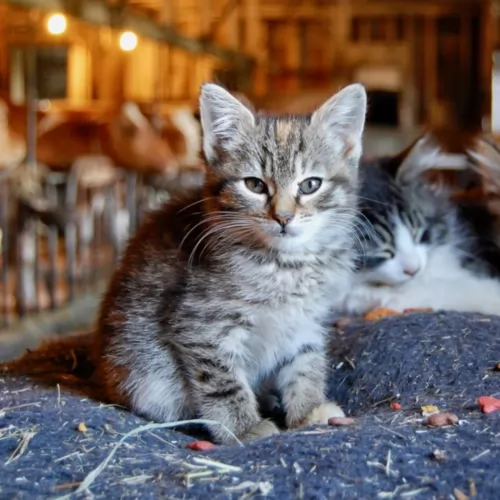 Farms cats are also members of domestic cats but it’s just that they are usually not socialized and they run away from people.
Farms cats are also members of domestic cats but it’s just that they are usually not socialized and they run away from people.
Farm cats have different histories and there is really no one-size-fits-all description of them.
They can weigh anything from 2 to 8kg. They can live to be anything between 10 and 20 years of age. Some of them are large, some small, some are solid colored while others are bi-colored and patterned. Their coats differ too and you can find short- and long-haired varieties among your farm cats
Their eyes and ears will also be in any shades and sizes and these cats are usually not spayed or neutered and can produce kittens that nobody is sure how they’ll turn out.
If you were to stumble across a farm cat born of unknown parents, there is no knowing what the small feline will behave like. Socialization and lifestyle play a big role in determining how a kitten will turn out but farm cats left to their own devices could be quiet, aggressive, loving, naughty, reticent, reserved, playful, lazy, shy or nervous.
The Selkirk Rex is a medium- to large-sized cat that will weigh between 3 to 6kg. He is a well-built cat of which you get a short- and long coat variety. The coat is available in all colors. The coat has a soft, woolly look to it with some curls.
With the long-haired variety, the cat has a well-plumed tail. One drawback perhaps is that the cat is a fairly heavy shedder, and perhaps wouldn’t be a good choice for those with allergies.
This is a lively, playful, energetic cat with a friendly temperament. Cat experts will tell you that it is the Persian and British Shorthair ancestors that have given him his placid, lovable nature. He is, however, more active than those cat breeds and loves to play.
Tolerant and affectionate, the Selkirk isn't a lap cat. Because he has a sociable nature, he dislikes being left alone for long periods of time.
The Selkirk Rex fits in well with households where there are well-behaved children and other pets. He is such a loving cat and loves to be in the company of his human companions. He isn’t demanding and likes to talk to you in a quiet voice.
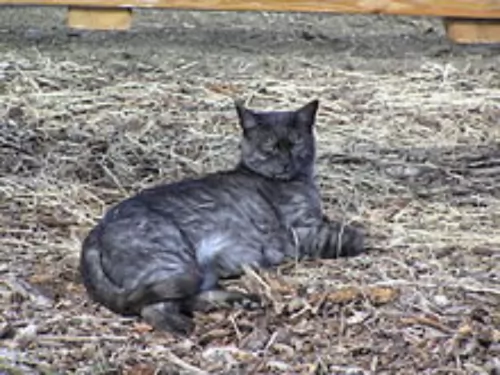 Farm cats are such wonderful animals – they just need a good chance in life like other domestic cats.
Farm cats are such wonderful animals – they just need a good chance in life like other domestic cats.
Many of them have had a hard life and it can be marvelous to open your home and heart to one or two of them and see the pleasure they bring.
They’re full of character and if you provide them with good food and a warm bed and promise to love them, you’ll no doubt be starting a solid and meaningful friendship that can enhance your life.
When you welcome a Selkirk Rex cat into your home, you’ll have a loving friend and companion.
They love to bask in the attention they get as they’re quite unusual with their wavy to curly coats. People are always wanting to touch it.
The Selkirk Rex cat is an active, playful cat and has a whole lot of love to offer you.
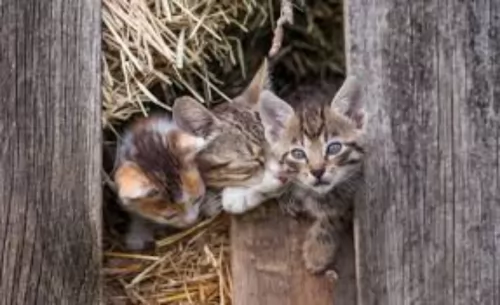 Farm cats left to fend for themselves can suffer from a host of illnesses. Eye infections are one. The cause of these eye infections is usually a virus, of which herpes, chlamydia, and Calicivirus are the most common.
Farm cats left to fend for themselves can suffer from a host of illnesses. Eye infections are one. The cause of these eye infections is usually a virus, of which herpes, chlamydia, and Calicivirus are the most common.
Your vet will certainly prescribe you some antibiotics for your kitten to help against secondary infections.
Check your farm kitten over as he is likely to have a nose full of snot as well and may even be sneezing. Take the kitten to the vet who can give him a good once-over and put him on the road to recovery.
The Selkirk Rex cat, if looked after well and given excellent food can live to be 15, 16, or 17 years of age. Some of these cats can suffer from hair loss. Remember, that every cat will require vaccinations and de-worming.
Chronic kidney failure usually develops over a number of months. Chronic kidney failure in cats is a progressive illness but if you get your cat to the vet it can be managed. The vet will want a sample of your cat's urine and possibly a blood test.
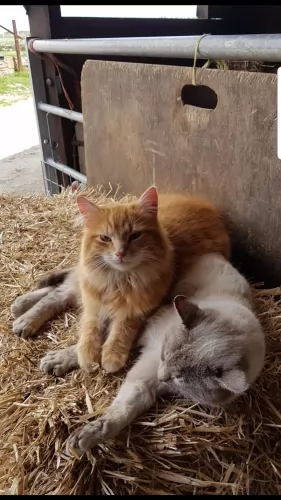 Barn cats or farm cats are not likely to have been neutered or spayed and they are just adding to the overpopulation of farm cats that can become feral cats.
Barn cats or farm cats are not likely to have been neutered or spayed and they are just adding to the overpopulation of farm cats that can become feral cats.
The average fertile cat can produce three litters every year, and with as many as 6 kittens in a litter, you can imagine how a small colony of cats can get out of control.
Sometimes cat rescue programs do a steri-drive and spay and neuter cats like this to curb the numbers. Of course, spaying and neutering can prevent many diseases as well.
If you have farm cats that have been spayed or neutered, provide them with good food and water. You can put out wet, canned cat food or dry kibble – they’ll be so pleased as most times these cats don’t even know where their next meal will come from.
You see them drinking out of puddles of water. Unfortunately, these pools are often filled with contaminants and this can also make the cats sick.
Every cat just wants a soft, warm place to sleep, and if you can, provide some warm dry hay for these farm cats. Even a cardboard box can be a haven for a cat that has never known a bed.
If you have managed to catch a farm cat kitten and you want to offer it a home, make sure to start off with veterinary care and vaccines.
Your Selkirk Rex will need to have his fur brushed. You don’t want to brush him too hard every week as this can cause the curls to frizz. Rather use a spray bottle with some cat conditioner and lightly spray the curls and use your fingers to ‘comb’ his hair.
Provide your cat with well-balanced meals. Your Selkirk Rex is a carnivore and you have to ensure that his food is made up of meat. The best commercially manufactured cat foods know how to correctly balance your cat’s food so that it gets the perfect blend of vitamins and minerals. Always choose a good brand of cat food that will meet your cat's nutritional needs. If you’re unsure, you can always ask your vet for suggestions about good quality food that will help towards ensuring good health for your cat.
The cheaper, unknown brands may not have the best ingredients to keep your cat happy and healthy. Remember to read the labels as a growing kitten will require different food to a senior cat.
Provide your Selkirk Rex with a litter box, scratching post, and a climbing tree.
Your kitten will need to be vaccinated to protect him from some of the life-threatening diseases cats can get. Most of the vets these days recommend a combined vaccine, starting at about 8 weeks of age. These vaccines will protect your kitten from Feline Leukaemia Virus, Feline Parovirus, and cat flu.